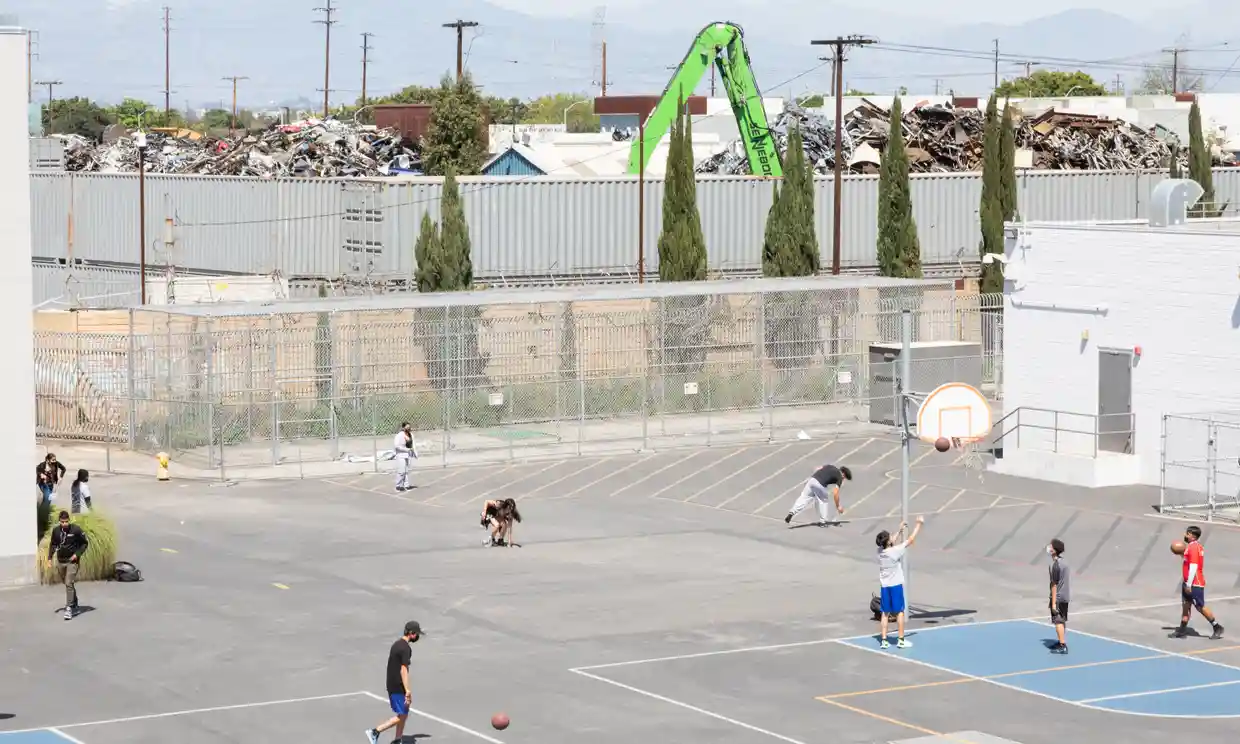The owners of a metal recycling plant operating next to a south LA high school campus have been hit with 22 felony charges, after decades of complaints that the facility was contaminating school grounds with lead and other toxic waste.
Announcing the charges on Wednesday, the Los Angeles district attorney George Gascón said that staff and students at Jordan high school in Watts, a predominantly Black and Latino neighbourhood, had been “potentially exposed to dangerous levels of pollutants on a daily basis”.
“The charging of Atlas Metal for their environmental crimes is a step toward justice for the children of Jordan high school and the community of Watts,” Gascón said at a press conference held outside the school.
For generations of students, the grey mounds of scrap metal looming over the school, past the softball field, were a familiar sight. A Guardian investigation last year found that high schoolers had become inured to the sounds and noxious smells coming from the Atlas scrap yard.
“The smell is just very, very nasty,” Genesis Cruz, a 2023 graduate of Jordan high, told the Guardian. “A sharp smell, like thick oil.”
Class lectures were punctuated by clangs and crashes coming from the S&W Atlas Iron & Metal Co recycling facility, which has been operating next to the school since 1949. On occasion, shards of metal have flown onto campus, and authorities have found dust laced with dangerous levels of lead – a neurotoxin – and other heavy metals atop sports fields and inside classrooms.
In addition to the 21 felony counts of knowingly disposing hazardous waste without a permit and one felony count of depositing of hazardous waste, the owners of Atlas, Gary Weisenberg and Matthew Weisenberg, also face a misdemeanor count for allegedly failing to minimise the risks of fire and public nuisance. An arraignment is scheduled for next week.
“I’m glad that Atlas is going to receive this action,” Timothy Watkins, a longtime community advocate and president of the Watts Labor Community Action Committee, said at the press conference. Still, he said, the charges alone will not “offset the harm that’s been done over the last 75 years”.
Watkins told the Guardian he and others had been raising concerns about the recycling plant, as well as lead pollution in nearby housing developments for decades before officials began to pay heed. “I’m just saying it took a whole lot more than it should.”
This is not the first legal action taken by local officials against Atlas. In 2020, the Los Angeles unified school district (LAUSD) sued Atlas in federal court and the next year, the city of Los Angeles filed suit against the recycler as well. Between 2017 and 2020, the school district spent $2.4m to test and treat the contamination on campus, only to find that dust was recontaminating the campus, district officials told the Guardian.
Gascón said that he hoped the criminal charges against Atlas “will serve as a deterrent to other companies that may be tempted to cut corners when it comes to environmental regulations”.
Benjamin Gluck, a lawyer for Atlas said that the company is “actively working with the many public agencies involved and is actually moving close to a global resolution”.
“The district attorney declined to engage with us and chose instead to file charges. We have not learned the details of those charges yet, but we will defend this case vigorously,” he said.
But for Watkins and other residents, the felony charges – after so many years of advocacy – are both a vindication and heartbreaking reminder that Watts has been neglected for too long. “If this was Beverly Hills, and you tried to have this next to Beverly Hills high school, oh my gosh,” Watkins told the Guardian. “It would be a joke. It would never happen.”
Watts is chequered with recycling plants, lumber yards and fabricators. Noxious pollution also emanates from a freight expressway east of the high school. The life expectancy here is about a decade lower than in wealthier parts of LA.
“I feel like a lot of people don’t really have the motivation to even stand up for themselves anymore, because they’re just so used to disappointment and they feel like nothing’s going to happen,” Cruz said. She hopes the DA’s charges will remind residents that their advocacy does matter. “It’s a very big deal,” she said.




